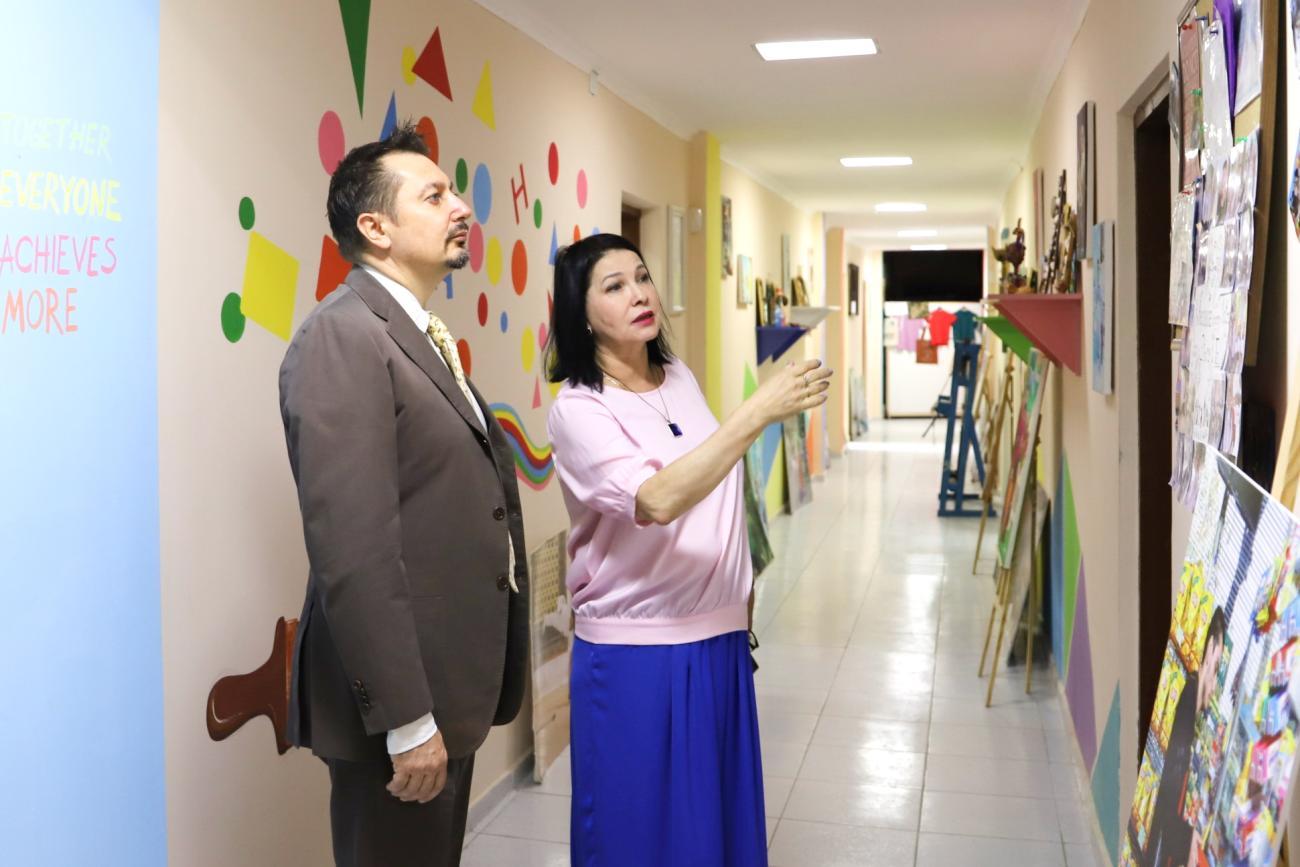“Different but equal” Promoting Disability Inclusion in Turkmenistan

Turkmenistan has some of lowest number of non-governmental organizations (NGOs) in the region, but they play a critical, outsized role in supporting vulnerable and disadvantaged communities across the country.
People with disabilities are one of the vulnerable groups most at risk of being left behind in Turkmenistan, often struggling to access social support, find employment and deal with daily discrimination and bias.
‘Yenme’ – which translates as ‘overcoming’- is a NGO working to meet the wide-ranging needs of people with disabilities and learning difficulties across Turkmenistan. Under the motto of “we are different but equal”, Yenme provides social support and rehabilitation services to these communities and their families, including children and adults with disabilities, elderly, young people and women.
At the end of 2022, with the support from the UN Resident Coordinator’s Office, Yenme received a grant from the EU-funded Regional Spotlight Initiative to pilot a new social project “A World without Gender Inequality” which empowers women with disabilities through specialist training and teaching.
Last month, UN Resident Coordinator in Turkmenistan Dmitry Shlapachenko visited the Yenme office in Ashgabat to learn more about how the pilot programme is being implemented on the ground and how their success story can inspire other NGOs in Turkmenistan find funding from new, non-traditional sources. The Resident Coordinator’s team sat down to speak with Yemne’s chairperson, Gulya Choreklieva. Here’s what she had to say:
What communities does Yenme serve? What is your mission and main principles?
Gulya: In 2005 we formed a group aimed at providing social support for children with special developmental needs and people with disabilities. Later on, the target audience began to expand as other vulnerable groups began to apply to the organization - youth, women, the elderly, large families, families with low income, orphans, victims of human trafficking, etc. As a result, the number of the organization's programs began to increase, which required funding for their implementation. Guided by the principles of social responsibility, in 2012 we created our organization, which we called "Yenme", means "Overcoming" in Turkmen. It was important for us to integrate and socially adapt children and adults with disabilities, elderly and low-income families, young people and women- those who are most vulnerable.
What barriers do people with disabilities face in Turkmenistan? Are there any special problems faced by women and girls with disabilities?
Gulya: People with disabilities in Turkmenistan face many challenges, ranging from societal stigma, to limited employment opportunities to the lack of support. Women and girls with disabilities often face additional challenges due to a gender bias and cultural norms. They may face barriers to education, employment, and social inclusion, further limiting their ability to fully participate in the society.
What is your organization doing to create employment opportunities for women and girls with disabilities in Turkmenistan?
Gulya: One of the organization's programs is focused on professional self-determination. The organization operates a vocational skills center for vulnerable youth. Many partners of our organization took part in equipping the center. Children are trained in confectionery, sewing and embroidery skills, arts and crafts. In the future, it will give them the opportunity to find employment. We also registered a social enterprise, which aims to create jobs for vulnerable groups.
75% of Yemne’s beneficiaries are women and girls. How has this programme impacted them?
Gulya: Let me tell you a touching story about a young woman named Gulnar. She has dwarfism and faced many difficulties in finding a decent job. Thanks to our program, Gulnar learned sewing and embroidery skills. Today she is able to prepare a pattern on her own and works on a professional sewing machine despite her small stature. She is becoming financially independent. Gulnar's success story is just one of many that demonstrate the transformational impact of the program on the lives of women and girls with disabilities.
What challenges do you face in obtaining sustainable funding?
Gulya: Obtaining sustainable funding is often a significant challenge for our NGOs. Limited financial resources and a lack of awareness about the importance of supporting this type of organization can make our efforts difficult. However, supporting civil society organizations is important because they fill gaps in social services, advocate for the rights of marginalized groups, and contribute to the overall development and well-being of communities.
What impact has funding from the Regional Initiative in Focus Program had on your NGO?
Gulya: "Spotlight" has had a significant impact on the development of our NGO and the implementation of projects. With additional resources we are able to expand our capacity and to strengthen our interaction with the public sector and other actors. This is a great opportunity to engage the civil sector sector, including a network of different NGOs supporting victims of gender-based violence and human trafficking.
How did the Resident Coordinator’s office support help your organisation increase its reach and impact?
Gulya: The Resident Coordinator’s office played an important role in facilitating the registration of our project with the government. Their support and advocacy helped us overcome administrative procedures and obtain the necessary approvals. Without their help, the project would have had serious difficulties in gaining recognition and legitimacy. The involvement of the Resident Coordinator’s office not only gave our initiative credibility, but also opened the door for further collaborations and partnerships. Their support has been invaluable in advancing our mission and positively impacting the lives of women and girls with disabilities in Turkmenistan.
To learn more about the work of the UN in Turkmenistan visit Turkmenistan.un.org













